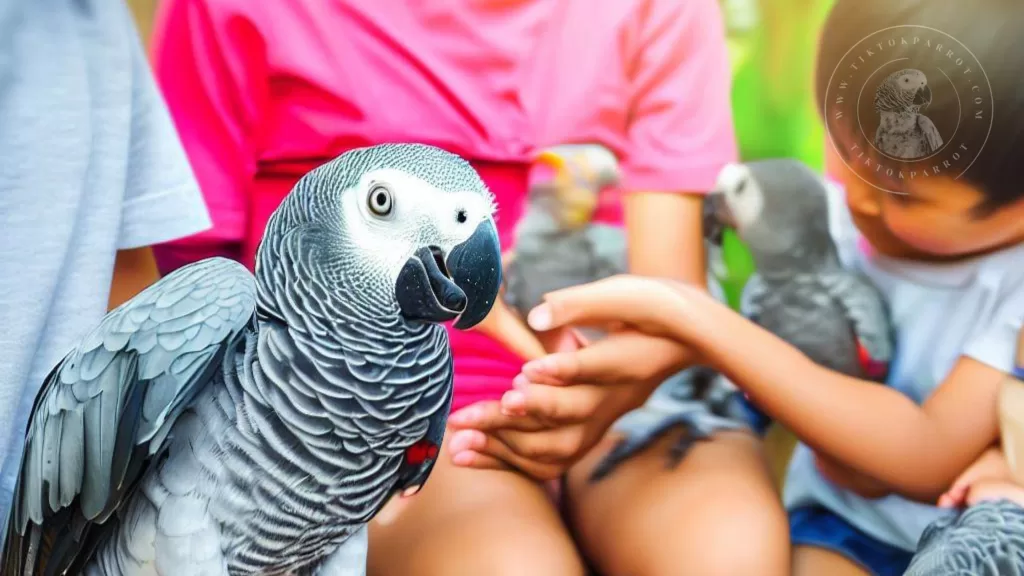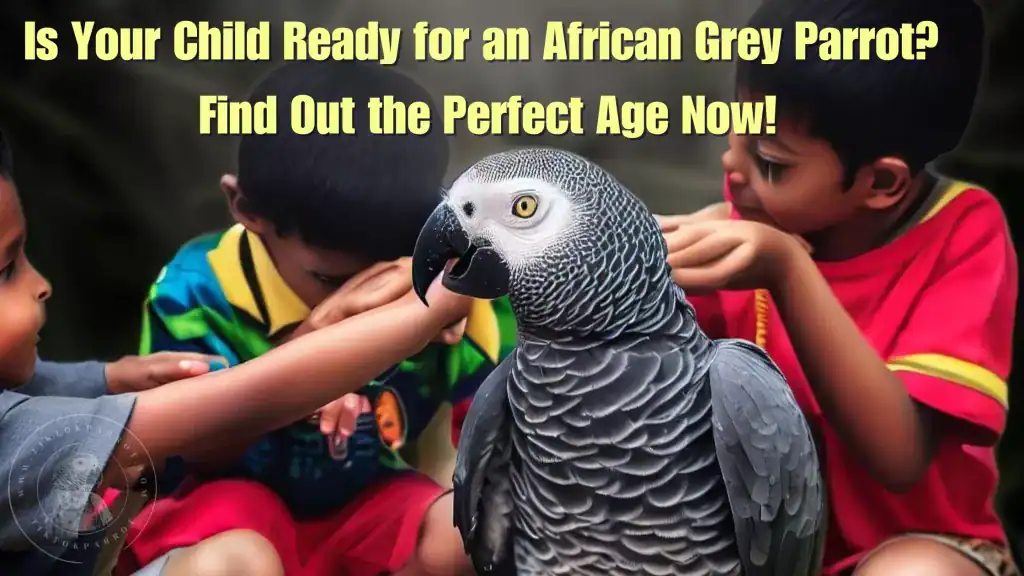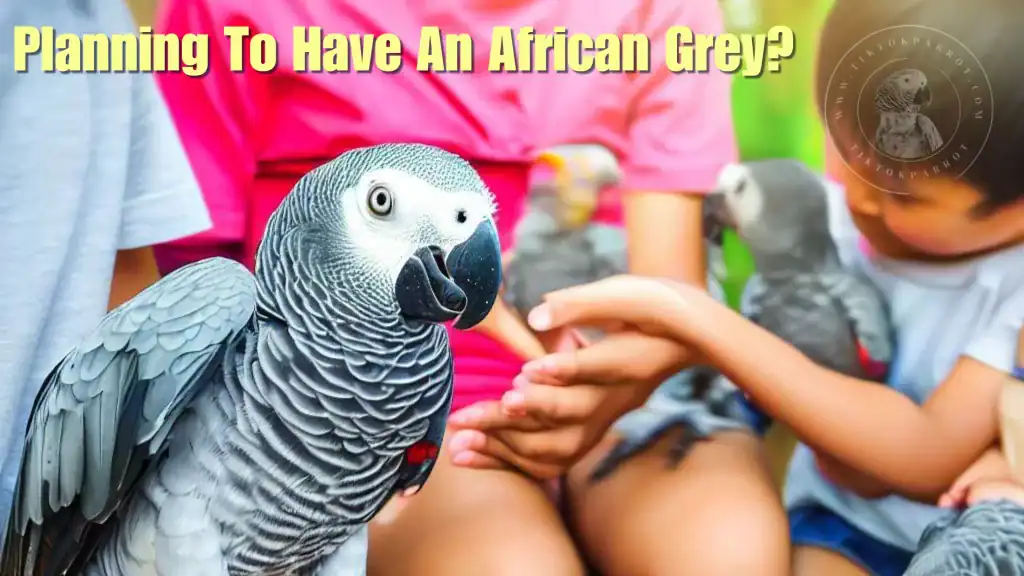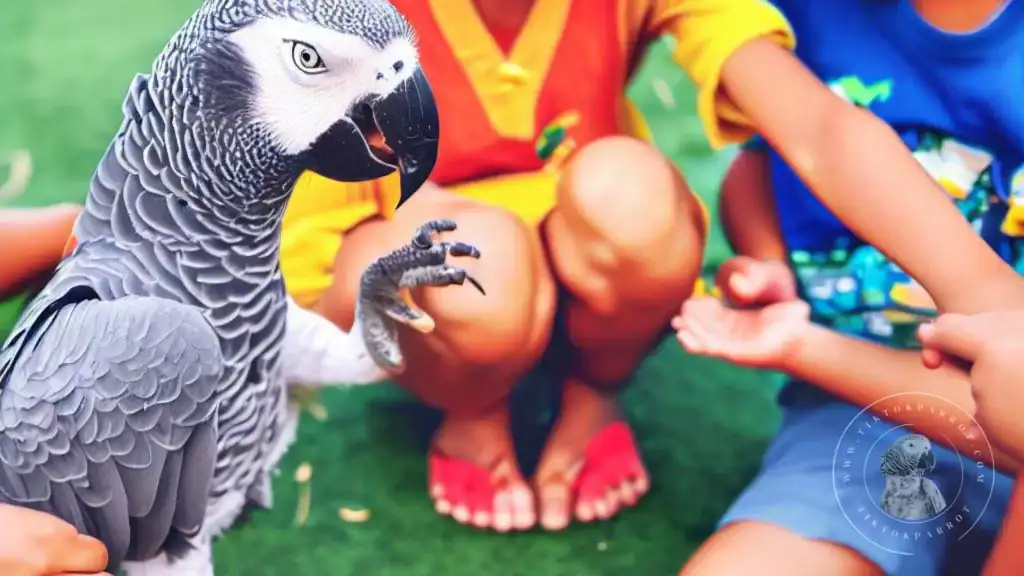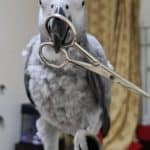If you have children, and are thinking about adopting an African Grey parrot for a pet, there’s really not much to worry about, aside of course, the added mess. Experts have said that the African Grey possesses the intellectual capabilities of a five-year-old child and the emotional capacity of a two-year-old, making them almost perfectly compatible with young kids.
Still, this is an extremely sharp animal (i.e. beak and claws), and as a general rule, parents keep their children away from any kind of sharps. Although domesticated, African Greys are similar to any other animal; they still carry around their natural instinct, and most of the time, children don’t really understand this.
Discover the perfect age for children to have an African Grey parrot in their home. Our comprehensive guide covers everything you need to know, from risks and benefits to tips for safe interactions. Find out how to provide a loving and engaging environment for your family and feathered friend. Read now and make an informed decision! What age children are suitable to have in a home with an African Grey Parrot?
For example, younger children tend to reach with their fingers between cage bars, eventually stressing the bird enough to get bitten or scratched. Ideally, children under the ages of seven and eight should not be left to care for an African Grey Parrot unsupervised.
You might also want to evaluate your children’s readiness to be responsible for a pet, particularly a parrot, which isn’t exactly on the same cuddle level as, say, a dog. It might be a good idea to set some ground rules with children on how to care for the parrot, as well as understand its many capabilities. Another thing to think about is allergies. Bird feathers tend to gather dust, and can be harmful to any resident asthmatics.
On the other hand, you ought to consider your bird’s welfare in addition to your kids’. Children tend to be quite noisy, especially around animals. Their excitement gets the best of them, and they tend to yell or scream at a parrot, subsequently stressing the bird out.
Remember, parrots don’t have the option of sitting down to a cold beer and an episode of “How I Met Your Mother” after a stressful day at work. No. Scared African greys resort to aggression, just like any other animal, and someone always ends up screaming afterward.
The worst that can happen to your bird is that it develops a disorder, either with its eating patterns or behavior. The worst that can happen to your kid is a broken finger and hours of tedious, reparative surgery. And oh, you might also end up deciding not to keep the African Grey after all, which is a downright shame considering what a great pet it can be.
The best thing you can do here is to sit the family down (and maybe include the bird, in case he may be inclined to listen) and make them understand their limits.
Evaluate if they can adjust their noise and activity levels around the parrot, and avoid making any sudden loud sounds or movements when caring for the bird. In addition, it’s a good idea to place the bird cage in a location that is out of the direct line of fire of common kid activities, like ball games or pellet guns.
Planning to have an African grey?
Are you considering getting an African Grey parrot but unsure if it’s suitable for your family with kids? Our comprehensive guide dives deep into this topic, providing you with everything you need to know before making a decision.
African Grey parrots are intelligent and engaging creatures, but they require a specific level of attention and care. In this article, we’ll explore what age children are suitable to have in a home with an African Grey parrot and what factors you need to consider.
As a first-time owner, learn how to create a loving and engaging environment for your family and feathered friend. Read on to discover if the African Grey parrot is the perfect choice for your home with children.
Introduction
African Grey parrots can make great pets for families, but they are not suitable for everyone. If you have children and are considering bringing an African Grey parrot into your home, there are some important things you need to know.
The Best Age for Children to Live with an African Grey Parrot
When it comes to what age children are suitable to have in a home with an African Grey parrot, there is no definitive answer. It depends on several factors, such as the child’s maturity level, the family’s lifestyle, and the parrot’s personality. However, as a general rule, it is recommended that children be 7 to 8 years or at least 10 years old before living with an African Grey parrot.
Factors to Consider
Several factors need to be considered before bringing an African Grey parrot into a home with children. Here are some of the most important ones:
The Child’s Maturity Level
African Grey parrots require a lot of attention and care. They are social creatures and need regular interaction with their owners to thrive. A child who is not mature enough to understand the bird’s needs or handle it gently could unintentionally harm it. A child who is old enough to handle the bird with care and understand its needs will be a better match for an African Grey parrot.
The Family’s Lifestyle
An African Grey parrot requires a lot of time and attention. It is essential to consider if the family’s lifestyle can accommodate the bird’s needs. If the family is often out of the house or travels frequently, the bird may not get the care and attention it needs to thrive. An African Grey parrot will do better in a home where someone is present for most of the day.
The Parrot’s Personality
African Grey parrots have strong personalities and can be unpredictable at times. Some parrots are more social and outgoing, while others may be more reserved and prefer quieter environments. It is essential to spend time with the bird before bringing it home to ensure that its personality is compatible with the family’s lifestyle and that of the children.
Don’t forget to read my own final thoughts at the end, and before that, let’s jump into the most frequently asked questions about this topic.
FAQs (frequently asked questions)
- Q: Can African Grey parrots be dangerous to children?
A: African Grey parrots are not inherently dangerous, but they can bite if they feel threatened or uncomfortable. It is essential to supervise interactions between the bird and children to prevent accidents. - Q: Can African Grey parrots talk to children?
A: Yes, African Grey parrots can talk and may form strong bonds with children. However, it is important to teach children to interact with the bird respectfully and avoid stressful situations. - Q: What should I do if my child is afraid of the African Grey parrot?
A: It is essential to respect your child’s feelings and work with them to gradually introduce them to the bird. Encourage your child to interact with the bird from a distance and offer positive reinforcement when they do so. - Q: How much time does an African Grey parrot need with its owner?
A: African Grey parrots require a significant amount of time and attention. They should have at least 2-4 hours of supervised out-of-cage time each day to exercise and interact with their owners. - Q: Are African Grey parrots good with children?
A: African Grey parrots can make great pets for families with children. However, it is important to supervise interactions between the bird and children and ensure that the child is mature enough to handle the bird with care. - Q: What are some tips for introducing an African Grey parrot to children?
A: It is essential to introduce the bird to the child gradually and ensure that the child understands how to interact with the bird respectfully. Encourage positive interactions and offer positive reinforcement when the child interacts with the bird appropriately. - Q: Why is it important to consider the child’s age before getting an African Grey parrot?
A: It is important to consider the child’s age as younger children may not have the maturity level required to handle an African Grey parrot. - Q: Are there any risks associated with having an African Grey parrot around young children?
A: Yes, there are risks associated with having an African Grey parrot around young children, including bites and scratches. - Q: Can children under 10 years old interact with an African Grey parrot under supervision?
A: Yes, children under 10 years old can interact with an African Grey parrot under close adult supervision. - Q: How can I teach my child to interact with an African Grey parrot safely?
A: It is important to teach children to approach the bird calmly, avoid sudden movements, and interact with it gently. - Q: Are African Grey parrots good with older children?
A: African Grey parrots can make great pets for older children who are mature enough to handle the bird responsibly. - Q: Can African Grey parrots bond with children?
A: Yes, African Grey parrots can form strong bonds with children who interact with them regularly and respectfully. - Q: How can I tell if my child is ready to live with an African Grey parrot?
A: You can tell if your child is ready to live with an African Grey parrot by observing their behavior around pets and their level of maturity. - Q: Can African Grey parrots be aggressive towards children?
A: African Grey parrots can become aggressive if they feel threatened or uncomfortable, but proper training and socialization can help prevent this. - Q: Are African Grey parrots better suited for families with older children?
A: African Grey parrots may be better suited for families with older children who are mature enough to handle the bird with care. - Q: How can I help my child develop a bond with our African Grey parrot?
A: Encourage your child to spend time with the bird, offer treats and positive reinforcement, and engage in positive interactions. - Q: What should I do if my child is too rough with our African Grey parrot?
A: It is important to teach children to interact with the bird gently and supervise their interactions to prevent accidents. - Q: Can African Grey parrots teach children responsibility?
A: Yes, owning a pet can teach children responsibility, but it is important to supervise their interactions and ensure they understand the bird’s needs. - Q: How can I help my child understand the African Grey parrot’s needs?
A: You can help your child understand the bird’s needs by involving them in its care, teaching them about its behavior, and setting clear boundaries. - Q: Can African Grey parrots be trained to interact with children?
A: Yes, African Grey parrots can be trained to interact with children, but it is important to supervise their interactions and teach children how to handle the bird safely. - Q: What should I do if my child is afraid of our African Grey parrot?
A: It is important to respect your child’s feelings and work with them to gradually introduce them to the bird, offering positive reinforcement and support. - Q: How can I ensure that my child and African Grey parrot get along?
A: You can ensure that your child and African Grey parrot get along by introducing them gradually, supervising their interactions, and teaching your child how to handle the bird gently. - Q: Are there any special precautions I should take when my child and African Grey parrot are together?
A: Yes, it is important to supervise their interactions, teach your child to approach the bird calmly and avoid sudden movements, and set clear boundaries. - Q: What should I do if my African Grey parrot bites my child?
A: If your African Grey parrot bites your child, it is important to clean the wound and seek medical attention if necessary. You should also work with a professional to address any underlying behavioral issues. - Q: Can African Grey parrots make good therapy animals for children with special needs?
A: Yes, African Grey parrots can make great therapy animals for children with special needs, but it is important to ensure that the child is mature enough to handle the bird with care. - Q: Can children help care for an African Grey parrot?
A: Yes, children can help care for an African Grey parrot, but it is important to supervise their interactions and ensure that they understand the bird’s needs. - Q: What should I do if my child loses interest in our African Grey parrot?
A: If your child loses interest in the bird, it is important to continue providing the bird with proper care and attention, and consider finding a new home for the bird if necessary. - Q: How can I teach my child about the importance of responsible pet ownership?
A: You can teach your child about responsible pet ownership by involving them in the bird’s care, setting clear boundaries, and modeling responsible behavior. - Q: Can African Grey parrots help teach children about the natural world?
A: Yes, African Grey parrots can help teach children about the natural world and the importance of conservation. - Q: How can I ensure that my child doesn’t become allergic to our African Grey parrot?
A: You can minimize the risk of allergies by keeping the bird’s cage clean and well-ventilated, washing your hands after handling the bird, and scheduling regular vet checkups. - Q: Can African Grey parrots help teach children about empathy and compassion?
A: Yes, owning a pet can help teach children about empathy and compassion, and caring for an African Grey parrot can be a rewarding and enriching experience for the entire family.
My Final Thoughts
I would say African Grey parrots can make excellent pets for families with children, but it is essential to consider several factors before bringing one into your home. Children should be at least 10 years old before living with an African Grey parrot, and their maturity level, the family’s lifestyle, and the parrot’s personality should be considered. With proper care and attention, an African Grey parrot can make a loving and engaging pet for the entire family.
Remember, owning a pet is a lifelong commitment, and it is essential to ensure that you can provide a suitable environment for the pet to thrive. With the right level of care and attention, an African Grey parrot can be a beloved member of your family for many years to come.
If you found this blog helpful, It would be great if you could share it with your family and friends who might find it useful as well.
You might like to read these as well 🙂
How to Gain the Love of an African Grey Parrot
Mastering the Art of Taming an African Grey Parrot
Surprising facts about African Grey Parrots
Why an African Grey Parrot Bites and What to do
Tips for Buying an African Grey Parrot
Raising African Grey Chicks: Tips for First-Time Owners
The Hidden Dangers of a Poor Diet for African Grey Parrots
What To Do If Your Parrot Is Choking, something stuck in the throat?
Playtime for Bird:How to Play with Your African Grey Parrot
The Importance of a Cage for Your African Grey Parrot
African Grey Parrot Male or Female? (Determine Gender of African Grey)
For more useful content about African grey parrots, you can subscribe my site with your email to get notification upon publishing a new blog, the subscribe box you can see on the right side of this page. Also if you get an alert on your web browser while browsing my site, allow it and that will also give you an alert whenever I publish a new blog. 🙂
Stay safe and much love !


If you are interested in supporting me, kindly consider utilizing my affiliate link for your Amazon purchases. Your support would be greatly appreciate.

